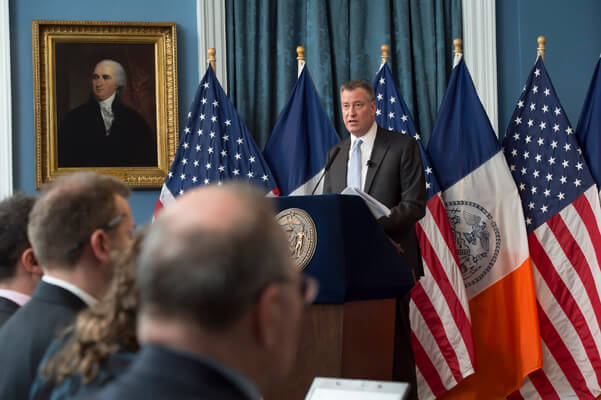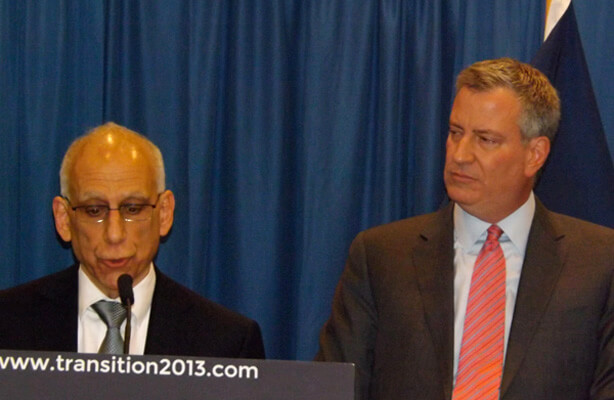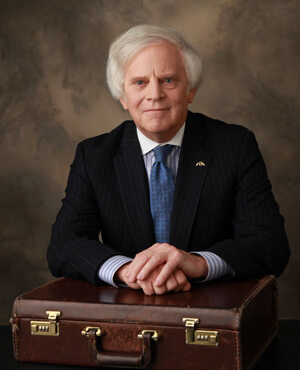Lois Herrera, Elayna Konstan, Michael Silverman, Jared Fox, and Councilmember Daniel Dromm in the September 17 public schools panel moderated by Gay City News’ Paul Schindler. | COURTESY: MELISSA SKLARZ
BY NATHAN RILEY | The New York City Department of Education (DOE) supports LGBT diversity, but with an uncertain trumpet that only erratically integrates queer concerns into the curriculum.
That was the message of a September 17 panel hosted by the Stonewall Democratic Club of New York City that included educators, the City Council’s Education Committee chair, and advocates.
The new de Blasio administration is all ears when it comes to inclusion. The Council Education chair, Daniel Dromm of Jackson Heights, is out and proud and devoted his committee’s second hearing this year to LGBT issues. And displays of goodwill on the panel, held at the LGBT Community Center on West 13th Street, were abundant, even if everyone agreed the results of the efforts at inclusiveness remain tentative.
Stonewall Democrats bring together DOE officials, advocates, out gay Council education chair
The evening opened with brief remarks from Schools Chancellor Carmen Fariña, who presented a humanistic philosophy toward public education at sharp odds with prevailing notions that schools today are workplaces where students apply themselves to learn skills needed to pass tests. The chancellor emphasized the need for schools to be safe as well as effective in socializing children, whose personal development is as important as the knowledge acquired. Explaining that the school system had earlier eliminated guidance counselors, she talked about the recent hiring of 200 to help young people with both their personal challenges and their career plans. (At a City Council hearing this week, the DOE acknowledged it is uncertain how uniformly the counselors are spread across the system.) And, demonstrating she is someone who cherishes the students she oversees, Fariña talked about the importance after-school programs play in helping middle school youth forge bonds with their peers.
The optimistic, youth-affirming tone carried over into the panel discussion, which included Dromm, Elayna Konstan, who heads up the DOE’s Office of Safety & Youth Development, Lois Herrera, the senior director of guidance and school counseling in the department, Michael Silverman, the executive director of the Transgender Legal Defense & Education Fund (TLDEF), and Jared Fox, the New York City chapter chair of the Gay, Lesbian & Straight Education Network (GLSEN).
Konstan opened the discussion by detailing the DOE efforts since 2008 — in which she has been a key player — in implementing its Respect for All program, which aims to curb bullying, harassment, and other bias-based infractions. Under a “Chancellor’s Regulation,” teachers and school staff receive training aimed at combatting bullying and incorporating diversity into the curriculum. It was not long into the panel, however, before unfortunate memories of the school system’s failed Children of the Rainbow curriculum of two decades ago surfaced.
That effort, launched in the early ‘90s primarily as a means of promoting racial harmony, soon became a political debacle. The curriculum spawned a media frenzy when several conservative community school boards — decentralized elected bodies since abandoned in the school system — raised a hue and cry over three pages out of a total of 443 that focused on families headed by gay and lesbian parents. Though the curriculum did not address same-sex behavior itself, one school board head in Queens labeled it “dangerously misleading lesbian/ homosexual propaganda.”
The chancellor at the time, Joseph A. Fernandez, tried to quell the furor, saying he was “saddened by the irony that teaching children the fourth ‘R’ — respect for their neighbors and themselves — has brought on the hateful condemnations.” However, the Board of Ed — which has also since been replaced by the mayoral-controlled DOE — sided with the conservatives and Fernandez soon left New York.
Those memories linger — and some LGBT advocates worry the negative lessons from 22 years ago continue to color the thinking today. One sore point is that teacher follow-up in the classroom is voluntary. Dromm was not shy about voicing his ire. Diversity instruction, he said, “often ignores LGBT people.” While acknowledging the voluntary nature of much of the Respect for All initiative, Konstan noted that teachers run a risk if they don’t teach material on which students will be tested.
One of the audience members on hand, Steve Ashkinazy, a founder of the Harvey Milk High School that serves at-risk LGBT students, left the panel fired up and dashed off a letter to his fellow Stonewall members arguing that “so long as teachers and principals are allowed to opt out, it’s a guarantee” that respect for the LGBT community “will never take hold in the areas where it is needed most.”
Dromm called for an end to a critical factor in the silence surrounding school bullying incidents. Though bias incidents concerning religion, ethnicity, gender, and disability are categorized as such, there is no tally of homophobic harassment and bullying. The Education Committee chair said the schools needed to keep track of its LGBT students and bias incidents targeting them in order to protect them.
GLSEN’s Fox disagreed, saying it was “unfair” to ask youth to “check a box” regarding still evolving identities. He argued his group is able to gauge trends in anti-LGBT incidents and attitudes through survey samples.
Dromm fired back, “Our invisibility is our greatest enemy.”
“How dumb can you get?,” Ashkinazy wrote of the different approaches the schools employ in tracking homophobic incidents versus those affecting other groups. “No wonder there are no available statistics on anti-LGBT violence in our schools.”
Dromm, a former schoolteacher who was out before protections against retaliation were in place and publicly faced off against one of the most conservative community school boards, was, for all his willingness to prod the school officials on the panel, also generous in praising their hard work. Stonewall and AIDS, he noted, are now part of the core curriculum, though he said that when Billie Jean King and Bayard Rustin are discussed it is vital that the impact of their sexual orientation be considered.
The panel also addressed challenges facing transgender youth in the schools — who were the subject of new guidelines developed over several years and issued by Fariña earlier this year. At their core, the guidelines make clear that students can use their chosen name even if different from their legal name and can participate in sports corresponding to their gender identity.
TLDEF’s Silverman praised the guidelines as a “tremendous step forward,” but raised worries about some details, including the use of bathrooms and other sex-segregated facilities. No child can be forced to use a particular bathroom, but the issue of what bathroom they can use is left open. Konstan emphasized that the question is left to case-by-case consideration and said the schools’ policy is focused on the needs of the transgender student, not those of others. Silverman, however, warned that it is important not to leave any student with the message that they cannot access facilities the same way any other boy or girl can.
Voicing concern about what she saw as the panel’s lack of diversity, one attendee, Octavia Y. Lewis, a trans woman and an education specialist in the Hetrick-Martin Institute’s transgender program, told the crowd, “I don’t identify as gay” and insisted that policy must ensure that each student be the “narrator of their own stories.
Eunic Ortiz, Stonewall’s president, noted that one issue unaddressed on the panel — moderated by Gay City News editor Paul Schindler — was the de Blasio administration’s decision to reverse Mayor Michael Bloomberg’s defense of DOE policy that barred the use of public schools by religious congregations on weekends. Under Bloomberg, the city contested a federal lawsuit brought by the Bronx Household of Faith to overturn the DOE ban. A leader in that fight is Bronx Councilman Fernando Cabrera, whose unsuccessful September 9 primary challenge to Democratic State Senator Gustavo Rivera brought to light a video Cabrera made last winter in Uganda praising that nation’s virulently anti-gay regime.
Ortiz made clear that the objective of at least some congregations trying to use the school is the promotion of similar Christian right beliefs, noting that such culture warriors “walk the hallways of the school, and openly anti-gay churches put posters up and leave material advertising their church.” Dromm noted that a deliberate and well-documented “church-planting” strategy to put evangelical Christian congregations in place in public schools across the nation has been underway for years.
Dromm brought down the house when he shifted from his critique of where the DOE has not gone far enough to his recommendations for what should be done. Students, he insisted, deserve “positive role models from out teachers” They should learn about gays and lesbians in history, lessons that serve as both a “window for straight students,” allowing them to see the contributions the LGBT community has made, and a “mirror for gay students,” emboldening them to see their potential. LGBT parents must be more involved in school life.
“We need to get the message out — gay is good,” Dromm said to thunderous applause.



































